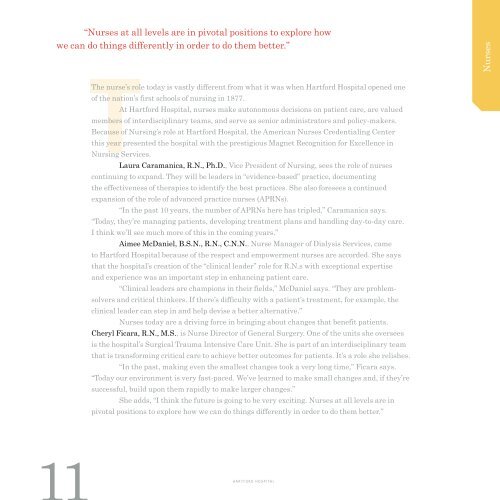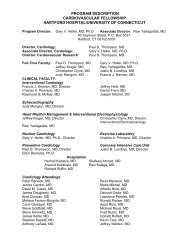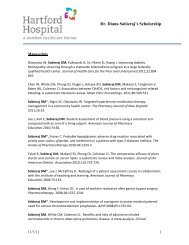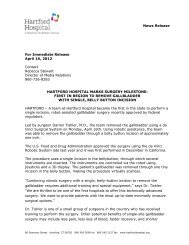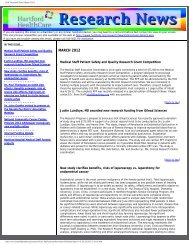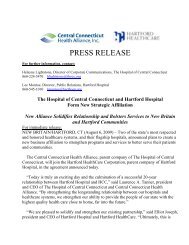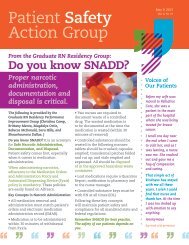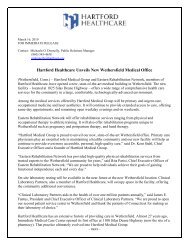2004 Hartford Hospital Annual Report
2004 Hartford Hospital Annual Report
2004 Hartford Hospital Annual Report
You also want an ePaper? Increase the reach of your titles
YUMPU automatically turns print PDFs into web optimized ePapers that Google loves.
“Nurses at all levels are in pivotal positions to explore how<br />
we can do things differently in order to do them better.”<br />
TThe nurse’s role today is vastly different from what it was when <strong>Hartford</strong> <strong>Hospital</strong> opened one<br />
of the nation’s first schools of nursing in 1877.<br />
At <strong>Hartford</strong> <strong>Hospital</strong>, nurses make autonomous decisions on patient care, are valued<br />
members of interdisciplinary teams, and serve as senior administrators and policy-makers.<br />
Because of Nursing’s role at <strong>Hartford</strong> <strong>Hospital</strong>, the American Nurses Credentialing Center<br />
this year presented the hospital with the prestigious Magnet Recognition for Excellence in<br />
Nursing Services.<br />
Laura Caramanica, R.N., Ph.D., Vice President of Nursing, sees the role of nurses<br />
continuing to expand. They will be leaders in “evidence-based” practice, documenting<br />
the effectiveness of therapies to identify the best practices. She also foresees a continued<br />
expansion of the role of advanced practice nurses (APRNs).<br />
“In the past 10 years, the number of APRNs here has tripled,” Caramanica says.<br />
“Today, they’re managing patients, developing treatment plans and handling day-to-day care.<br />
I think we’ll see much more of this in the coming years.”<br />
Aimee McDaniel, B.S.N., R.N., C.N.N., Nurse Manager of Dialysis Services, came<br />
to <strong>Hartford</strong> <strong>Hospital</strong> because of the respect and empowerment nurses are accorded. She says<br />
that the hospital’s creation of the “clinical leader” role for R.N.s with exceptional expertise<br />
and experience was an important step in enhancing patient care.<br />
“Clinical leaders are champions in their fields,” McDaniel says. “They are problemsolvers<br />
and critical thinkers. If there’s difficulty with a patient’s treatment, for example, the<br />
clinical leader can step in and help devise a better alternative.”<br />
Nurses today are a driving force in bringing about changes that benefit patients.<br />
Cheryl Ficara, R.N., M.S., is Nurse Director of General Surgery. One of the units she oversees<br />
is the hospital’s Surgical Trauma Intensive Care Unit. She is part of an interdisciplinary team<br />
that is transforming critical care to achieve better outcomes for patients. It’s a role she relishes.<br />
“In the past, making even the smallest changes took a very long time,” Ficara says.<br />
“Today our environment is very fast-paced. We’ve learned to make small changes and, if they’re<br />
successful, build upon them rapidly to make larger changes.”<br />
She adds, “I think the future is going to be very exciting. Nurses at all levels are in<br />
pivotal positions to explore how we can do things differently in order to do them better.”<br />
Nurses<br />
HARTFORD HOSPITAL


